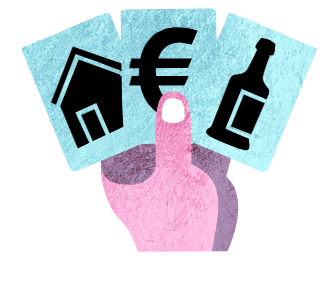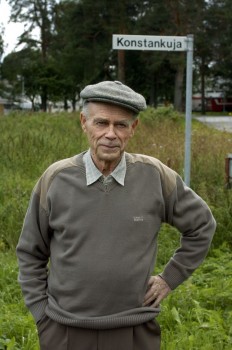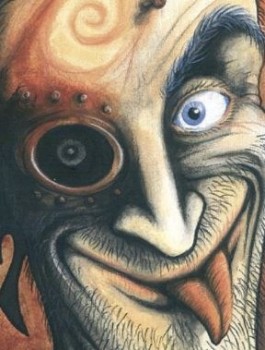Search results for "witesman"
On the meaning of translation
28 February 2013 | This 'n' that
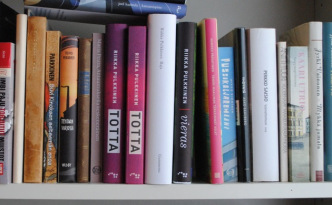 Translations of Finnish literature into English are booming, according to a new website set up by the Finnish-English Literature Translation Co-operative, or FELT.
Translations of Finnish literature into English are booming, according to a new website set up by the Finnish-English Literature Translation Co-operative, or FELT.
Or at least there is a tiny boom, as translator Lola Rogers puts it in her contribution to ‘Reflections’ on the FELT website.
Whereas less than 20 translations were published between 1992 and 2002, the number of translations published in the decade from 2002 was more than 34.The reason, according to FELT, is the new availability of qualified literary translators, whom the new website has been created to represent; each of them (David Hackston, Emily Jeremiah, Kristian London, Lola Rogers, Owen Witesman) now have two or more published Finnish works of fiction under their belts.
A significant factor has been the training events organised by FILI, Finnish Literature Exchange, publisher of this magazine – and, we might dare to say, Books from Finland itself, which offers translators a forum (as well as payment) for translations of extracts from interesting or significant new work.
The FELT website is worth a visit by anyone with an interest in Finnish literature – or translation. As well as details of published and forthcoming work, there is a collection of essays on the art of translating particular works, from Kristina Carlson (also ex-Editor-in-Chief of Books from Finland) to the novelist Asko Sahlberg and the modernist poet Eeva-Liisa Manner.
About us
8 January 2009 |
The Books from Finland online journal ceased operation on 1 July 2015, and no new articles will be published on the site.
A comprehensive online archive is available for readers to access. Brief extracts from Books from Finland may be quoted, provided that the source is cited.
If you wish to use longer extracts, please contact .

Books from Finland, an independent English-language literary journal, was aimed at readers interested in Finnish literature and culture. Its online archive constitutes a wide-ranging collection of Finnish writing in English: over 550 short pieces and extracts from longer works by Finnish authors were published from 1967 onwards.
Books from Finland featured classics as well as new writing, fiction and non-fiction, and other materials aimed at giving readers additional information on Finnish society and the wellsprings of Finnish literature. The target audience encompasses literary and publishing professionals, editors, journalists, translators, researchers, students, universities, Finns living abroad and everyone else with an interest in Finland and its literature.
Of course, publishing Finnish and Finland-Swedish literature in English requires skilled translators. Books from Finland’s editorial policy was always to use native English-speaking translators. In recent years David Hackston, Hildi Hawkins, Emily & Fleur Jeremiah, David McDuff, Lola Rogers, Neil Smith, Jill Timbers, Ruth Urbom and Owen Witesman translated for us.
Books from Finland was founded in 1967 and appeared in print format up to the end of 2008. From 2009 to 2015 it was an online publication. The journal’s archives have been fully digitised, and remaining issues will be made available in late 2015.
The Finnish Book Publishers’ Association (Suomen Kustannusyhdistys, SKY) began publishing the print edition of Books from Finland in 1967 with grant support from the Finnish Ministry of Education and Culture. In 1974 the Finnish Library Association (Suomen Kirjastoseura) took over as publisher until 1976, when it was succeeded by the Helsinki University Library, which remained as the journal’s publisher for the next 26 years. In 2003 publishing duties were handed over to the Finnish Literature Society (Suomalaisen Kirjallisuuden Seura, SKS) and its FILI division, which remained its home until 2015. The journal received financial assistance from the Finnish Ministry of Education and Culture throughout its 48 years of existence.
The editors-in-chief of Books from Finland were Prof. Kai Laitinen (1976–1989), journalist and critic Erkka Lehtola (1990–1995), author Jyrki Kiiskinen (1996–2000), author and journalist Kristina Carlson (2002–2006), and journalist and critic Soila Lehtonen (2007–2014), who had previously been deputy editor. The journal was designed by artist and graphic designer Erik Bruun from 1976 to 1989 and thereafter by a series of graphic designers: Ilkka Kärkkäinen (1990–1997), Jorma Hinkka (1998–2006) and Timo Numminen (2007–2008).
In 1976 Marja-Leena Rautalin, the director of the Finnish Literature Information Centre (now known as FILI), became deputy editor of Books from Finland. She was succeeded by Anna Kuismin (neé Makkonen), a literary scholar. Soila Lehtonen served as deputy editor from 1983 to 2006. Hildi Hawkins, who had been translating texts for the journal since the early 1980s, held the post of London editor from 1992 until 2015.
The editorial board of Books from Finland was chaired from 1976 to 2002 by chief librarian Esko Häkli, from 2004 to 2005 by the Secretaries-General the Finnish Literature Society, Jussi Nuorteva and Tuomas M.S. Lehtonen, and from 2006 to 2015 by Iris Schwanck, director of FILI. Members of the board included literary scholars, journalists, authors and publishers.
This history of Books from Finland was compiled by Soila Lehtonen, who served as the journal’s deputy editor from 1983 to 2006 and editor-in-chief from 2007 to 2014. English translation by Ruth Urbom.
The politics of difference
17 June 2011 | Non-fiction, Tales of a journalist
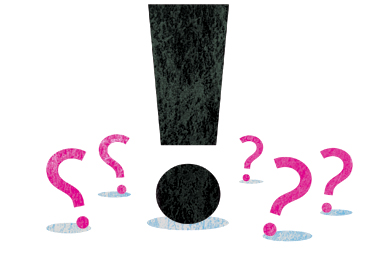
Right or wrong, my country? Illustration: Joonas Väänänen

Right or wrong, my country? Illustration: Joonas Väänänen
Big electoral turnouts are generally considered a good thing. But, writes columnist Jyrki Lehtola, in Finland the fact that the vote went up in the last Finnish general election caused a revelation. Educated urbanites and the media (perhaps near enough the same thing), are shocked by how 20 per cent of their fellow Finns think – and the ramifications caused tremors all across Europe
Listen up. Diversity is a resource. Except of course if it’s the sort of diversity that is a resource for the wrong people.
That sort of diversity isn’t the least bit nice. In Finland in the spring, we ran into the sort of diversity that even got the rest of Europe to start worrying. Out in the thickets and forests, diverse people had been springing up in secret, people of whose existence we urbanites were entirely unaware.
And they threatened to bring Europe down. Europe. Which was a bit much. More…
On the rocky road to a good translation
19 November 2010 | Essays, Non-fiction
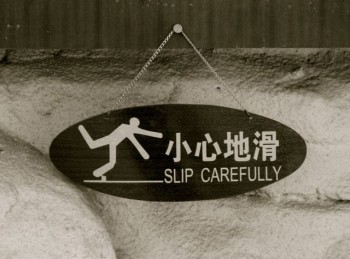
You get the picture? A translation error in China. Photo: Leena Lahti
Why just three per cent? Translator Owen Witesman seeks an explanation for the difficulties of selling foreign fiction to the self-sufficient Anglo-American market. Could there be anything wrong with the translations?
I am a professional translator, and I have a secret: I don’t read translations.
I’m not alone. The literary website Three Percent draws its name from the fact that only about 3 per cent of books published in the United States are translations (the figure for Germany is something like 50 per cent). There are various opinions about why this is, including this one from Three Percent’s Chad Post writing at Publishing Perspectives.
Why do I say it’s a secret that I don’t read translations? Because people expect me to read translations, as if as a translator it were my sacred duty to show solidarity with my professional community. Or maybe I can’t be cosmopolitan otherwise. More…
What grade is your kid in?
29 October 2010 | Non-fiction, Tales of a journalist
Should a journalist show his hand? Columnist Jyrki Lehtola ponders the pros and cons of showing one’s true political colours
What’s the best way to present an initiative that would get the cynical, lazy news media to take an interest in the outside world?
The easiest way is to make a proposal in which the outside world is actually defined as the news media itself.
This is exactly what Matti Apunen did early this autumn: Apunen, a long-time journalist and the former editor-in-chief of the Aamulehti newspaper, had just left the paper to lobby for Finnish industry and trade interests as director of the Finnish Business and Policy Forum EVA.
He presented the Finnish media with a straw poll, following the Swedish model, in which reporters would anonymously answer questions about their political leanings. More…
Inside and out
14 February 2011 | Reviews
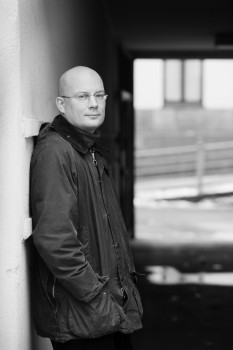
Markku Pääskynen. Photo: Ville Palonen
It is typical of Markku Pääskynen’s fiction for horrible things to happen both in people’s internal worlds and what goes by the name of the objective reality around them, and you can’t always be sure which one they’re happening in – or they’re happening in both.
From his debut novel, Etanat (‘Snails’, 2002, Tammi), onwards Markku Pääskynen (born 1973) has created a highly original body of work. His special strengths are his linguistic and narrative virtuosity, which allow him to make surprising events and narrative solutions come off in a controlled manner.
Pääskynen’s third novel, Tämän maailman tärkeimmät asiat (‘The most important things of this world’, 2005, featured in Books from Finland 1/2006), was a description of a single day that focused on the relationship between an adult son and his mother. Pääskynen’s sixth book, Enkelten kirja (‘Book of Angels’, 2010), is constructed out of sensory perceptions, thoughts, feelings and memories. The reader has to stay on his toes in piecing together the course of events, gradually revealed from behind these elements, and to find the story behind the plot. More…
A long list of good novels
27 November 2014 | In the news
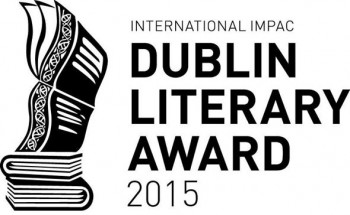 The longlist for the International IMPAC Dublin Literary Award 2015 has been announced and, among the 142 translated novels – from 39 countries and 16 original languages – are two from Finland.
The longlist for the International IMPAC Dublin Literary Award 2015 has been announced and, among the 142 translated novels – from 39 countries and 16 original languages – are two from Finland.
Mr Darwin’s Gardener by Kristina Carlson (Peirene Press, UK, 2012), a novel set in the 1860s England, is translated by Emily and Fleur Jeremiah (see the extracts in Books from Finland).
Cold Courage, a thriller by Pekka Hiltunen (Hesperus Press, UK), is translated by Owen Witesman. Both entries were nominated by Helsinki City Library.
Among the authors writing in English are Margaret Atwood, J.M. Coetzee, Roddy Doyle, Stephen King, Jhumpa Lahiri, Thomas Pynchon and Donna Tartt.
This literary award was established by Dublin City, Civic Charter in 1994. Nominations are made by libraries in capital and major cities throughout the world, on the basis of ‘high literary merit’. In order to be eligible for consideration in 2015 a novel translated into English must be first published in the original language between 1 January 2009 and 31 December 2013.
The award for a translated novel is worth €75,000 to the author, €25,000 to the translator. The shortlist of ten titles will be announced by an international panel of judges in April 2015, the winner in June.
We’ll be keeping our fingers crossed for our ex-Editor-in-Chief Kristina Carlson!
Misery me
Extracts from the collection of short prose, Mielensäpahoittaja (‘Taking offense’, WSOY, 2010)
Past pushing up daisies
Well, yeah, so I took offense when the doctor said that considering my age I’m in tip-top shape. His theory was that my 25-kilometre ski circuits would keep an old coot like me in shape, if they didn’t kill me first. He said if I were to start just sitting on the couch and waiting, then the Reaper would be on my back in no time.
I don’t ski for my health. I ski because it’s pretty in the forest, and when a body is sweating he doesn’t think a whole lot. More…
Celebrity boobs and other news
9 October 2012 | Non-fiction, Tales of a journalist

Illustration: Joonas Väänänen
Anyone can find the latest news and the vital information he or she requires – latest pictures of some celebrity’s breasts, the reasons why men cheat on their wives – immediately from the Internet. Jyrki Lehtola takes a look at why the printed media are in trouble
We are living in an age of newspaper death. Several publications have already closed up shop in Finland just this autumn. The most notable of these was Finland’s oldest and most influential teen magazine, Suosikki (‘Favourite’), which had been in circulation for some 52 years.
This was where several generations, particularly the boys of several generations, got all of their information about sex, where they learned how to tape posters to their walls without them peeling off, where they got information about rock stars’ drug use and favourite foods and where they learned that even if something can be expressed with a period, expressing it with an exclamation point is still preferable. More…
Child of chaos
10 September 2010 | Comics, Fiction
A cornucopia of exciting plots and strange characters, the mythic epic Kalevala has inspired innumerable artists since its first publication in the 1830s. A recent interpretation of the story of an extremely tragic hero named Kullervo takes the form of a graphic novel by Gene Kurkijärvi: his urban Kullervo lives in a grim environment – not unlike Helsinki, but carrying with dystopian overtones – where the heroes and/or villains are steely androids and hairy weirdos who shoot drugs and use foul language. This 21st-century Kullervo is a surrealist cyberpunk tragedy – laced with pitch-black comedy.
Extracts from the graphic novel Kullervo by Gene Kurkijärvi (Like, 2009; captions translated by Owen Witesman) More…
What are we like?
4 February 2011 | Non-fiction, Tales of a journalist

To be, or not, a true Finn? Illustration: Joonas Väänänen

To be, or not, a true Finn? Illustration: Joonas Väänänen
Elections are coming: what will the vox populi, the voice of the people, dictate? And which people will be deciding Finland’s political future? As columnist Jyrki Lehtola reports, a political debate has arisen about the ‘right’ and the ‘wrong’ sort of pollster – and the ‘right’ and ‘wrong’ kind of Finn
Finland will be holding parliamentary elections in April. We’ve been organising them every four years, like clockwork, for the past two decades, a rare example of stability in a parliamentary democracy. Finland is the European Union’s model student, and the differences between our main political parties are nearly pro forma (who wouldn’t want to protect nature? who wouldn’t want better health care?), so elections in recent years have been more like an endearing tradition than significant, world-changing events.
However, this year everything is different. The upcoming elections have forced us to look in the mirror – and we aren’t liking what we’re seeing. More…

